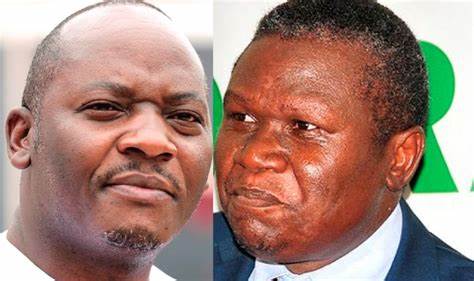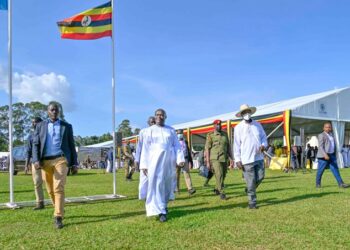Mathias Mpuuga’s latest clash with Norbert Mao highlights the tragic comedy that has become Uganda’s political landscape. The Justice and Constitutional Affairs Minister, who often postures as a “democratic reformist,” has once again proven that he’s nothing more than a glorified mouthpiece for a crumbling regime that thrives on deception. During the Monday morning debate on NBS Television, Mpuuga laid bare the reality that Ugandans are tired of: Mao’s so-called electoral reforms are nothing more than a mirage in a political desert.
Mpuuga, the Nyendo-Mukungwe MP and National Unity Platform (NUP) vice president for central Uganda, wasted no time in shredding Mao’s credibility, comparing his empty assurances to “carrying around voting ink cans with no ink” — a blunt metaphor that captures the minister’s hollow promises perfectly. And indeed, what has Mao brought to the table? Nothing but hot air and broken dreams. His attempt to peddle non-existent reforms is akin to selling water to a drowning man. This level of dishonesty is not just laughable—it’s an insult to the intelligence of every Ugandan yearning for genuine change.
Mpuuga’s criticism goes beyond mere words. He accused Mao of trying to pacify Ugandans with vague assurances while hiding behind empty rhetoric. “There’s not even a draft on paper,” Mpuuga asserted, hammering home the truth that the so-called reforms are just a charade. Mao, as expected, responded with defensive posturing, accusing Mpuuga of using his name for personal gain. Yet, the real question remains: what exactly is Mao doing in the Justice and Constitutional Affairs ministry if not performing like a puppet on Museveni’s strings?
This isn’t the first time Mao has played the fool in Uganda’s political theater. His appointment as minister was never about bringing meaningful reform—it was about neutralizing opposition and creating the illusion of inclusivity. The Democratic Party president is more concerned with maintaining his ministerial seat than with fulfilling his so-called democratic ideals. And so, his promise that “Ugandans will soon smell the aroma of the cookies” is nothing but a pathetic attempt to distract from the fact that he is baking nothing. There are no cookies—only crumbs of false hope.
Mpuuga’s resolve to push his own electoral reforms, including reinstating presidential term limits, is a bold step in the right direction. His determination exposes the impotence of Mao and others like him who merely masquerade as agents of change. The truth is, Uganda’s political elite is too intertwined with Museveni’s regime to bring about any significant change. What Mpuuga is offering, however, is a rare spark of integrity in a swamp of corruption and complacency.
The history of Uganda’s electoral reforms is a history of broken promises and unfulfilled court orders. Since Dr. Kizza Besigye’s initial challenge in 2001, through Amama Mbabazi’s attempts in 2016, the Supreme Court’s directives have repeatedly been ignored. Mao’s promises today are no different—they are empty words designed to buy time and placate a frustrated populace. His role in Museveni’s government is not to enact change but to stifle it, and every Ugandan should see through his façade.
Mpuuga’s stance against Mao is a critical reminder that Uganda’s hope for genuine electoral reform will not come from career politicians who have sold their souls for ministerial perks. Mao’s time as a credible reformist is over—if it ever existed. What Uganda needs is leaders who will push for real change, not those content to sit at Museveni’s table, nibbling on crumbs while pretending to serve the people.







Discussion about this post